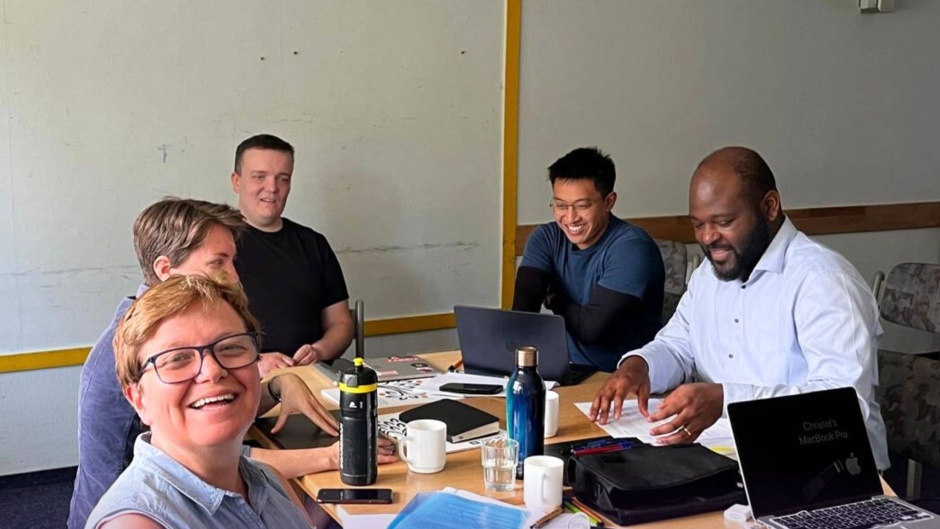Good discipleship includes knowing how to pray and reflect on politics and engage as good citizens.
 Julia, Christel, and members of the 'Christian Political Participation in a Divided World' group sharing some reflections between sessions. / [link]IFES Graduate Impact Facebook[/link]
Julia, Christel, and members of the 'Christian Political Participation in a Divided World' group sharing some reflections between sessions. / [link]IFES Graduate Impact Facebook[/link]
As socio-political challenges and tensions grow, as debate can become vicious, many Christians feel it is safer to keep out of the way of politics.
When the word “Evangelical” is seen by some as a toxic, political label, some of us hide while others want to push back forcefully.
The average local church does not dare touch on current affairs in its teaching ministry for fear of opening up division. It seems wiser to stick to teaching on the Gospel and discipleship.
[destacate] The average local church does not dare touch on current affairs in its teaching ministry for fear of opening up division[/destacate] But, of course, good discipleship includes knowing how to pray and reflect on politics and engage as good citizens. The Gospel is not just the message of the Cross and the way to salvation. Jesus’ preaching of the Gospel was focused on the Kingdom of God – a deliberately political term.
Our socio-political thinking and acting are part of our witness. It is an opportunity not to be lost to point people to the King of kings.
It was an absolute privilege for me to spend a week in July, teaching about politics to Evangelicals from very different nations and backgrounds.
My fellow teacher (& former EEA colleague) Christel Lamère Ngnambi and I led the participants on a journey of understanding God’s desire and pattern for politics and society and how Christians can engage.
We all learned from one another, taking the whole Bible story seriously and examining what’s going on in our world carefully.
[destacate]Our socio-political thinking and acting are part of our witness. It is an opportunity not to be lost to point people to the King of kings [/destacate] Among many other things, we reflected on the beauty of biblical law and values. We learned how to use the Bible appropriately to shape our thinking on policy. We analysed our nations and the ideologies (& idolatries) around us.
We looked at how politics works (or should work) and what Christian citizens, campaigners or public figures can do.
We imagined being Christians in government with the responsibility for migration; How would we wrestle with biblical imperatives, our government role and political pressures?
We reflected on how to both argue and disagree well, in ways that honour Christ. We kept returning to the core truth that all human beings are made in the image of God. Therefore, they are of infinite value. But they are also all sinful. So politics should fully take into account these two realities.
The week ended with the teachers asking the participants what they would do as a follow up to the course. Yes, they had all enjoyed the week. But what difference had it made?
[destacate]We looked at how politics works (or should work) and what Christian citizens, campaigners or public figures can do[/destacate]One of the students said she was encouraged to do some more writing. Here is part of an article Emily Lange has published for IFES in Portugal.
“We started our reflection [during the course] on political participation at the roots, looking to Genesis 1 and 2 for the biblical image of reality.
Who is God and who are we? We are beings created in the image and likeness of God, and we live in a world and societies created by him.
One of the first things that stands out in the picture of the beginning of the world is the fact that God is powerful.
God had the ability to create everything… Everything. And from nothing. Our heads can’t really comprehend this. But from here we can think about how God, this most powerful being on the face of the earth, deals with power.
And if there’s one thing that moderates God’s power, it’s his character. ‘And God said, “Let there be light,” and there was light.’ What God said actually happened, which indicates that we can trust his word.
And we see that God quickly includes the human being in their relationship of love and coexistence, and in the creative act. There are walks in the evening and Adam has the freedom to name the animals.
Thinking about politics in terms of power relations can be useful, because it ends up including all of us. Undoubtedly, those who hold political office or leadership positions will have a greater scope for action.
A decision – good or bad – will have repercussions that reach further than a power relationship between father and son. But we all exercise power in some way.
Today we live in a complex and difficult world and we often have to return to the image of the Garden of Eden, to remember that we have been called to co-govern a world that God has given us.
And to seek in our relationship with God the ongoing transformation of character that can moderate our exercise of power, whether in our relationships, at home, in church, in society, with creation, or within ourselves.”
Julia Doxat-Purser, socio-political representative of the European Evangelical Alliance. This article was first published by the EEA and re-published with permission.
[analysis]
[title]One more year[/title]
[photo][/photo]
[text]At Evangelical Focus, we have a sustainability challenge ahead. We invite you to join those across Europe and beyond who are committed with our mission. Together, we will ensure the continuity of Evangelical Focus and Protestante Digital (Spanish) in 2024.
Learn all about our #OneMoreYearEF campaign here (English).
[/text][/analysis]

Las opiniones vertidas por nuestros colaboradores se realizan a nivel personal, pudiendo coincidir o no con la postura de la dirección de Protestante Digital.
Si quieres comentar o